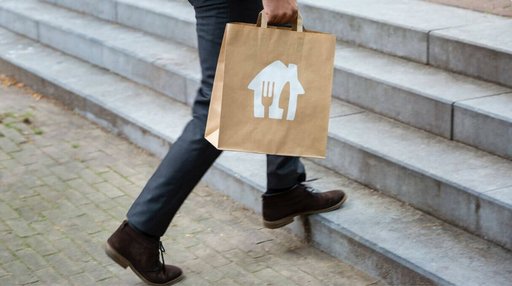'The Danish model' meets food delivery platforms
Most food delivery riders fall outside the scope of the ‘Danish model’, its comprehensive system of social welfare and the industrial relations model where trade unions bargain collectively for a large proportion of workers. Steps are needed to protect riders in Denmark, although the degree of insecurity and contractual terms vary. Recent domestic and EU developments and a collective bargaining agreement at Just Eat may give riders a reason for optimism.
Riders at the margins of the Danish model
Some may argue that the Danish model of welfare and industrial relations provides the necessary safeguards to buffer the risks of precarity that are commonplace in the global food delivery industry (or the platform economy at large). Afterall, Denmark is known to provide a comprehensive public health and social welfare system that aims to protect citizens from the risks of unemployment, sickness, disability and old age with generous benefits. This provides a safety net allowing Denmark to have a flexible labour market with comparatively low levels of employment protection – meaning employers are relatively free to hire and fire. Danish employment law is primarily governed by collective bargaining agreements, individual employment contracts and case law. While there is a minimum set of statutory rules that apply to almost all salaried employees, pay and working conditions are regulated by collective bargaining agreements.
The active role of the Danish social partners (the trade unions and employers) lead to high collective bargaining coverage - even as high as 73% in the private sector according to an article by the Confederation of Danish Employers from 2018. The system generally leads to regulated wages, access to sick leave, occupational pensions, as well as full pay during parental leave for the majority of people.
But this means that the non-standard forms of employment commonly used by food delivery platforms lead to little or no employment-related social protection. Many riders do not even enjoy the minimum levels of protection offered by, for example, the Danish Act on Salaried Employees (Funktionærloven). Without collective bargaining agreements, they face the full brunt of the Danish model’s flexible labour market: no minimum wage, no set maximum working hours, no provisions for paid sick leave or holiday, flexible regulations about dismissal, and no agreed rules about information and consultation of workers or strikes and lockouts. Riders are therefore likely to find themselves at the margins of the Danish model with far less protection than most employees in Denmark.

Bogus self-employment
The majority of food delivery platforms in Denmark still rely on sub-contracting – hiring riders as ‘partners’ rather than employees. The self-employed status stands in contrast to the lived experiences of riders who work for the same platform repeatedly or even daily, are closely supervised through algorithmic management in terms of task assignment and performance tracking, and who receive payments through the platform’s app or website in the same way as many employees. Food delivery platforms such as Wolt and Hungry.dk define themselves as ‘digital intermediaries’ instead of employers with managerial control. They are thereby not legally bound to fulfil (costly) employer responsibilities such as safeguarding health and safety measures, sick pay, holiday pay, insurance, or social security contributions. Critics say that this is ‘bogus self-employment', a practice common in the global food delivery sector which has detrimental effects on the protection of riders’ social and labour rights.
Consequently, ‘self-employed’ riders bear the responsibility for their own employment-related social security. In theory, they could at least apply for state-financed compensation during e.g. sick leave or maternity/paternity leave – however, this depends on whether the rider is registered as self-employed (not required unless yearly gross incomes exceed 50,000 Danish Crowns), how long they have worked as self-employed, how many hours they have worked per week, and whether their yearly income is high enough to qualify for support. In most cases, riders will have difficulty meeting all these requirements and need to set aside a part of their earnings to save up for sick or parental leave, as well as for their pension, insurance contributions, or holidays. This is difficult considering the low and volatile earnings of riders. Solo self-employed riders are further disadvantaged in the Danish welfare system as eligibility criteria for other welfare programmes have become stricter and increasingly bound to things like employment status, a minimum set of working hours, or length of formal employment (see Mailand & Larsen, 2018 for more on this). This leads to unequal access to and lower levels of social protection.
Other forms of low wage & non-standard employment
Some riders are actually employed, but forms of non-standard employment are used by, for example, Just Eat: ‘on-call’ work contracts for regular (<30h/week) or marginal part-time (<15h/week) work. These employment contracts give riders employee status, but their nature may still lead to disadvantages in terms of social protection. Especially if combined with temporary contracts and low earnings, fulfilling the increasingly tight entitlement rules of welfare programmes can also become difficult for employed riders that work fewer hours than standard employees. They may for instance face difficulties in meeting minimum income requirements for eligibility to unemployment insurance benefits. With regards to contribution-based social protection programmes such as occupational pensions, riders’ non-standard working hours and low hourly pay also translate into low future payouts. This is problematic, partciularly considering that occupational pensions are growing in importance compared to the Danish state pension.
Low sectoral collective bargaining coverage
Because of their self-employed status, improving working conditions through a collective bargaining agreement remains virtually impossible at some platform companies, such as, Wolt and Hungry.dk. This is in part due to EU antitrust legislation: self-employed riders are considered ‘undertakings’, and therefore agreements on ‘prices’ (wages) among self-employed riders could be considered cartel-like behaviour ‘distorting’ market competition. Negotiating collective bargaining may nevertheless be possible. Danish competition authorities may grant self-employed service providers immunity to competition laws when it is demonstrated that they “perform services under the same terms as employees, at the same entity and under the instruction of the employer whilst performing the tasks“ (see Munkholm & Schjøler, 2018). One such exemption has been granted in the first collective agreement at the cleaning service platform Hilfr (see Anne Ilsøe's work on this e.g. this research paper published by Copenhagen University's Employment Relations Research Centre from 2020). However, this case can be considered an exception rather than the norm. Trade union efforts can be impeded by union or work council busting by some platforms, and attempts to enter into negotiations with Wolt or Hungry.dk have so far been in vain. In this way, companies challenge the Danish system of industrial relations which relies on the adoption of collective agreements.
The food delivery sector overall shows low collective bargaining coverage for riders in Denmark. Only Just Eat has recently (in October 2021) entered into a collective bargaining agreement negotiated by the Danish Chamber of Commerce (Dansk Erhverv) and the trade union 3F. This is an important watershed to ensure protection of the most essential social and labour rights as well as a stable, regulated income for Just Eat riders. However, although Just Eat is the market leader (ca. 70% market share), it employs less riders in all of Denmark (ca. 600 riders) than Wolt (ca. 6 % market share) which in the capital region alone employs around 1500 riders. At Just Eat, only 10% of its total business in Denmark is based on its own deliveries, the majority of deliveries are organised by restaurants themselves. The collective bargaining agreement therefore cannot cover all riders active on the Just Eat platform. Hungry.dk and Wolt who have a larger workforce than Just Eat remain without a collective bargaining agreement, so the effect of this new agreement remains marginal.

Occupation-specific risks
Food delivery riders may also face occupation-specific risks which are common in the industry:
- low job mobility due to little or no access to training and career development, keeping riders in a ‘dead-end job’;
- income insecurity due to performance-based earnings- and bonus-systems leading to low and often volatile incomes;
- risk of exposure to traffic accidents, heightened through performance pressure from algorithmic management and control (tying earnings to the speed of deliveries); and,
- barriers to establishing bodies for worker representation and unionization, including the lack of common workplace (isolated work processes), a high turnover, the lack of familiarity with local unions and labour law among foreign riders, as well as the disparity in interests and membership incentives between side-job riders and full-time riders.
Looking ahead – is the Danish model ready to buffer riders’ risks of precarity?
The collective bargaining agreement at Just Eat is an important first step towards improving riders’ social and labour rights in Denmark: it regulates a sectoral minimum wage, overtime bonus, holiday pay, sick pay, wage compensation during parental leave, occupational pension, and workers’ interest representation through shop stewards. It shows that over time (and legal employment status), the Danish model can positively shape riders’ rights when trade unions step in to new, previously unorganized sectors. It is possible that Just Eat’s collective bargaining agreement marks a shift towards a new sectoral standard. However, as long as Hungry.dk and Wolt - whose rider fleets outnumber Just Eat’s - continue to rely on solo self-employed riders and make no effort towards collective bargaining, the majority of riders in Denmark will remain firmly outside the ‘Danish model’ without rights otherwise considered the norm for most Danish employees.
Considering current regulatory developments, however, pressure on Hungry.dk and Wolt to discontinue bogus self-employment might increase: A recent decision in January 2022 by the Danish Tax Council (SKAT) found in favour of one Wolt rider's employment status and could mean that Wolt (instead of its riders) has to pay taxes and labour market contributions. Additionally, a new EU directive was drafted in December 2021 to improve working conditions on digital labour platforms, including a ‘rebuttable presumption of employment’ that would also guarantee riders default employment status unless disproved by the company in question. This might mean the end of ‘food delivery as usual’ - unless companies find yet new ways of blocking these initiatives.
Further reading:
- Anna Ilsøe, The Hilfr agreement – Negotiating the platform economy in Denmark. FAOS Research paper (2020).
- H. Hauben, K. Lenaers, and S. Kraatzpe, 'Platform economy and precarious work: Mitigating risks', Briefing requested by the EMPL Committee (European Parliament), Directorate-General for Internal Policies (June 2020).
- Mikkel Mailand, Mikkel and Trine Pernille Larsen, Hybrid work – Social protection of atypical employment in Denmark, WSI Study, No. 11, (Hans-Böckler-Stiftung, Wirtschafts- und Sozialwissenschaftliches Institut (WSI), Düsseldorf, 2011).
- Natalie Videbæk Munkholm and Christian Højer Schjøler, 'Platform Work and the Danish Model – Legal Perspectives', Nordic Journal of Commercial Law, 1 (2018).
- Stine Rasmussen, Trine Pernille Larsen, Anna Ilsøe and Per Kongshøj Madsen, Atypical labour markets in Denmark. Nordic future of work Brief 5. Fafo, 2019. (Fafo is an independent social science research foundation).
Links:
- Article on Conferederation of Danish Employer’s website (Dansk Arbejdsgiverforening) website 'I Danmark er de fleste dækket af overenskomst' [In Denmark, most people are covered by a collective agreement], 16th December 2020 (In Danish).
- Article on Social Europea by Valerio De Stefano and Antonio Aloisi, 'European Commission takes the lead in regulating platform work', 9th December 2021.
- Article on 'Notes from Below' website by Jack Campbell, 'A cycle of struggles in Copenhagen', 17th November 2020.
- Article on trade union 3F's website (In Danish). 'Banebrydende overenskomst: Nu kan danskere bestille takeaway med god samvittighed' [Pioneering agreement: Now Danes can order takeaway with a clear conscience], Fagbladet 3F. (January 27, 2020).
- Collective agreement on food delivery work between Danish Chamber of Commerce – Employers and United Federation of Danish Workers (3F) Transport Group, 2021-2023
- European commission’s proposals to improve the working conditions of people working through digital labour platforms in December 2021

